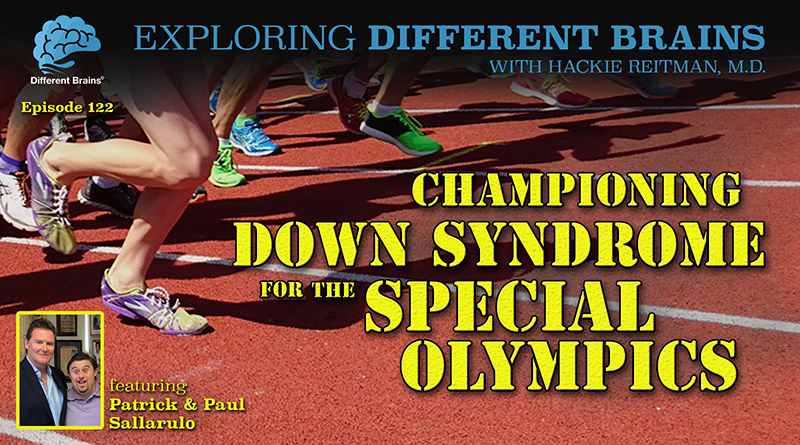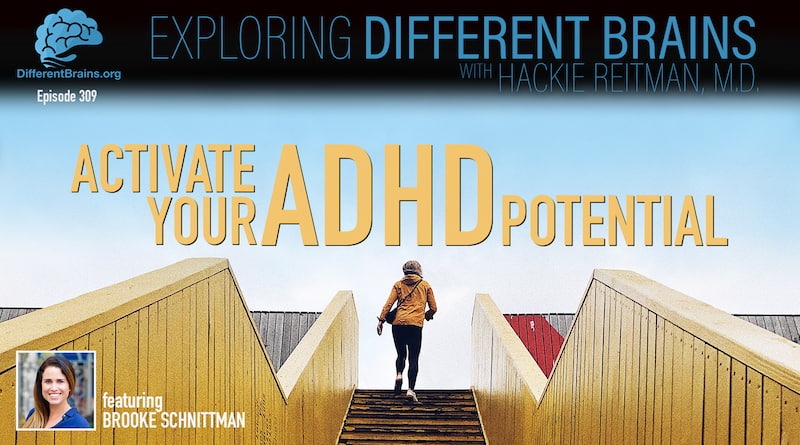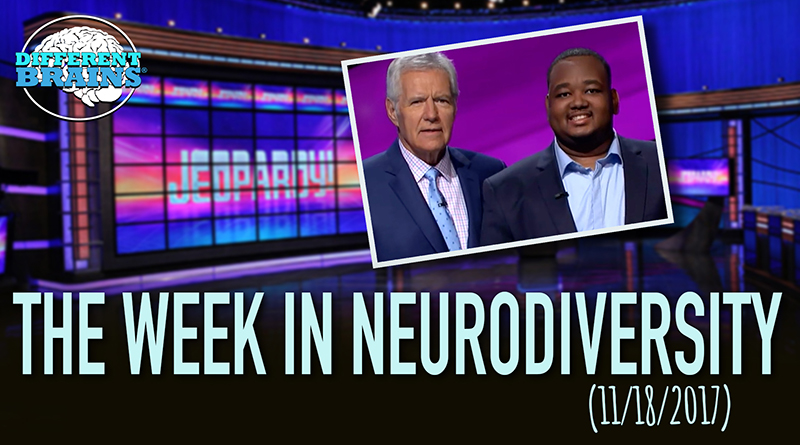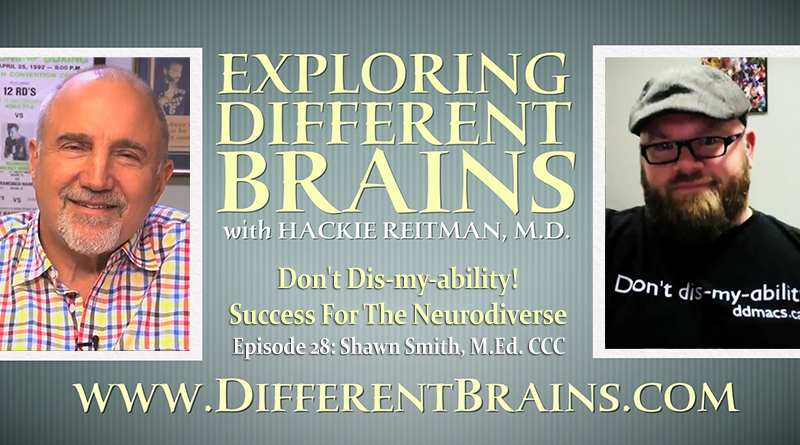
Championing Down Syndrome for the Special Olympics, with Patrick & Paul Sallarulo | EDB 122
(14 mins) In this episode, Dr. Hackie Reitman speaks with Special Olympics athlete Patrick Sallarulo, and his father Paul. The group discusses Patrick’s interests, the important role the Special Olympics play in his life, and why their family began Sallarulo’s Race of Champions.
For more information, visit: SallarulosRaceForChampions.org
.
42 Second Preview:
.
To listen or download the podcast version of this episode, see the embedded player below.
Or look for us on your favorite podcast provider:
iTunes | Stitcher | SoundCloud
[expand title=”View Full Transcript”]
HACKIE REITMAN, M.D. (HR): Hi, I’m Dr. Hackie Reitman and welcome to another episode of Exploring Different Brains. Today, we have a special guest. My friend, Patrick Sallarulo, who is a special olympics athlete. Patrick, welcome to Different Brains.
PATRICK SALLARULO (Patrick S): Thank you.
HR: Thanks for being here.
Patrick S: You’re welcome.
HR: Now, I heard that you had a part time at Walmart or Walgreens or something?
Patrick S: I work at Walgreens.
HR: Oh you do. What do you do their at Walgreens?
Patrick S: Walgreens. I do stocking. Stocking the shelves.
HR: So you’re stocking the different items. Do you like doing that?
Patrick S: Yeah.
HR: That’s very organized, huh?
Patrick S: I’ve been working at Walgreens for 2 years.
HR: Nice. I hear they’re a good organization to work for. They’re good people to work for?
Patrick S: Yeah.
HR: Now I understand that you’re a Special Olympics athlete.
Patrick S: Yeah. That me.
HR: Yep. What sports do you compete in?
Patrick S: I do basketball, swimming, bowling, paddle board, ski.
HR: Wow. That’s a lot of stuff.
Patrick S: And bocce ball.
HR: Bocce ball huh? That’s the Italian sport. Can you tell us about Sallarulo’s Race for Champions?
Patrick S: That my name.
HR: That’s your name. How did your name get on it? Your family does that race?
Patrick S: My mom. my dad, my brother, and my grandparents.
HR: What are some of the things you’d eventually like to do?
Patrick S: I like to do going to New York to see my cousins.
HR: I’m going to be speaking down in Washington D.C. at a big event and what might you say to inspire other people to somebody your age to encourage them?
Patrick S: I tell them be honest.
HR: Be honest is the key.
Patrick S: Think.
HR: Use your brain and think. It’s been a real pleasure having you here Patrick. Thank you very much.
Patrick S: Thank you.
HR: Now, because Patrick Sallarulo said it’s ok, we’re also gonna be talking to his dad, Paul Sallarulo. So, Dad, Paul Sallarulo, you must be very proud of your son Patrick.
PAUL SALLARULO (Paul S): Yes I am. My number one son. Is that right?
Patrick S: Yes.
Paul S: Yep. Numero uno.
HR: Tell us how it came to be, your involvement of you and your family in the Special Olympics here in South Florida.
Paul S: Well, I actually started when I was 16, so over 45 years ago. I started in upstate New York in Lake George, working with kids with challenges in the camp. I had no idea that G-d was gonna gift me with Patrick. It was kind of preparation. You know? We got a surprise for you down the road, and it was a great surprise. Been doing it ever since.
HR: And how did you evolve into Sallarulo’s Race for Champions?
Paul S: Well, I lost both my parents, and I want to do something as a tribute to them. I kinda got tired of everyone picking on the Italians either being in the Mafia or whatever, so we wanted to do something special and we decided to do one run. I was turning 50, and we have some great athletes. Athletes are terrific, you know? Some of them are so good, they compete in China, in Korea, and some of them are really, really good. So I said, “I think it’s time that I need to get in shape.” How are these kids gonna look with me as the chairman? So I started a half marathon in Disney World. It was just me and we raised $135,000. So I thought, well, if I can raise that much, what can we raise if we have a 5K here in Fort Lauderdale? What we wanted to do was at that time, we only had 300 athletes in Broward County.
HR: Wow.
Paul S: We have 46,000 people with special needs. So now we have 6,200 athletes. So we’ve been doing this for about 12 years now; we raised about 6 or 7 million, and all the money goes to Broward County, which is important because we still have to reach thousands of more people. For instance, I was at a function the other day; I was talking to one of the gentlemen there, and he was telling me about his sister who has special needs. He said, “I watch my sister during the day; my mom watches her at night, because I’m the manager of a restaurant.” I said, “What about Special Olympics?” He was so excited to learn about what we do, that we have 23 sports, and she’s gonna get involved, and kinda give the man and mom a little bit of a break. So unfortunately, people don’t know about our program. They really think it’s one event or two events a year. They don’t realize this is every day. We have to raise money for our athletes to buy uniforms, feed them, to transport them, because basically what we do is we follow the Olympics. We do the Special Olympics for us; our kids are in South Korea before the regular Olympics, and then the Power Olympics is after the regular Olympics. So we sent two of our athletes to ski in South Korea a couple of months ago, and that’s how good some of our athletes are.
HR: Wow.
Paul S: So anyway, getting back to the race, we just wanted to bring more people, to have more people to spend on outreach, on educating people, to bring their students in. Patrick, most of your friends, would you say that most of your friends are from Special Olympics?
Patrick S: Yes.
Paul S: A lot of your pals? Would you tell Dr. Reitman you’re involved with ALPs, right? Athletic Leadership Program?
Patrick S: Yeah.
Paul S: What is ALPs mean to you? What is ALPs?
Patrick S: ALPs means to behave yourself.
Paul S: Well, besides behaving yourself, do you go around talking to people about the benefits of Special Olympics?
Patrick S: About what you’re doing. We raise money through Tip a Cop.
Paul S: They raise money through Tip a Cops. So what the Athlete Leadership Program is, they go around the community and they talk to people about what Special Olympics means to them and what it could mean to people with special needs and how it changes their lives.
HR: Well, certainly you know, I remember the first time I was at, 2015 I was given a keynote, Tim Shriver out at the Special Olympics ceremonies in LA and everything. And when we went where they had the medical tent set up for USC, I said to Tim Shriver, “I didn’t know that this was all a front to deliver great medical care to a hundred nations,” because I was with some kids who got first hearing aid tests and we were comparing hearing aids, and they fitted them right there. Same with eyeglasses. Kids from all over the world.
Paul S: Well, that happens to be someone that I know, Mr. Gollasano, who donated a lot of money for that, the healthy kids program. And you know they give sneakers out, shoes, and hearing aids and eyeglasses. It’s really a great program. As a matter of fact, we just had our area games in March, in early March, and healthy kids were there too, showing them how to exercise and so forth. It’s really a great program.
HR: Nice.
Paul S: Yeah.
HR: Anne was sitting at our table, who’s the, Anne Costello, who kinda runs the Gollasano Foundation. They do great stuff out in Rochester. I’m understanding that they’re gonna have a stronger presence in Florida.
Paul S: We’re hoping. You know, one of the things that people don’t realize is 64% of our athletes are below poverty income level. So a lot of these parents don’t enough money even to drive them to their programs. We just received a $200,000 grant from Broward County to help our athletes get to the programs where their parents can’t take them.
HR: That’s great. Special Olympics provides so many tools that we know are good for all of us, for all our brains. Socialization is key, exercise, education about a good diet, you know, and all of these things are tools you can really use. Getting together and have a pathway. Patrick, what would say, what is the most fun thing that you do? What do you like doing the best?
Patrick S: The best? I like to go on vacation.
Paul S: Vacation.
HR: Where do you go for vacation?
Patrick S: We go to New York.
HR: You go to see your cousins up there?
Patrick S: Yes.
HR: Yeah, that’s good. So you’re close with your cousins. That’s great.
Paul S: He’s got a lot of them.
HR: So we’re talking with Paul Sallarulo and his wonderful son, Patrick Sallarulo. We’re learning here at Different Brains all about the Special Olympics, the different programs, and you know, Sallarulo’s Race for Champions down here in South Florida. Where can people learn more about Sallarulo’s Race for Champions?
Paul S: Just on the website. You just look up Sallarulo’s Race for Champions or Broward County Special Olympics.
Patrick S: You want to come?
HR: I think I would like to come. I don’t think I can run, I got two bad hips, though.
Paul S: He’s gonna hang out with us.
HR: Can I walk?
Paul S: We’re gonna put you in the sponsor area and hang out with us.
Patrick S: Oh. The other day, I got first place in bocce.
Paul S: First place in bocce. Well, what do you expect from an Italian kid? You better be good at bocce ball, right?
HR: Got to.
Paul S: Gotta be good. A couple years ago, he and I were the best in the state. It’s unified. So we have unified programs, too. So you can have a typical person and someone with special needs bowling, bocce ball, whatever it is. And it’s fun.
Patrick S: He’s my partner.
Paul S: But he’s better than me. He’s good at defense. To talk about what the program actually means to our athletes, I’ll give you one example. We had one, never spoke a word, was with us for less than a year, and now you can’t shut him up. He’s on the ALPs program, he taught himself Spanish, he has his own art facility where he’s a painter. He does unbelievable things, and his mother contributes to Special Olympics because he kinda was lost by himself. Now he’s surrounded by people who have the same needs as he does and it’s, you know, God doesn’t make any mistakes. I mean we’re all here for a reason. It’s a great organization that Special Olympics, and it’s so wonderful that the Kennedy family started this, and it’s nonpolitical because you have Republicans and Democrats and all kinds of people just doing the right thing, helping athletes. And one of the fallacies is everyone thinks it’s kids, but kids get older. So they start out at 8 and we have some of our athletes that are 90 and now we’ve started a new program for the people under 8 years old because, you know, they have a lot of needs too. So it’s just a remarkable thing that the Shrivers actually, the Shrivers started.
HR: Well, it’s great. We want both of you to keep up the good work you’re doing.
Patrick S: Yeah.
HR: And also the close affiliation with the AAMD people, with the SMILE program, and the healthy, all the different associate medical and dental programs. With them, Dr. Steven Perlman, Dr. Rick Rader, nationally, and many others.
Paul S: We’re working on, they have a program at NSU as well. Nova Southeastern University working with people with special needs.
HR: Great. All right, well listen. It’s been a pleasure having you both here on this episode of Exploring Different Brains. We’ve had Patrick Sallarulo and his father Paul Sallarulo, and we’ve spoken about Sallarulo’s Race for Champions and so many other things. Thank you both for being with us today.
Paul S: Thank you for having us.
Patrick S: Thank you.
[/expand]
.




